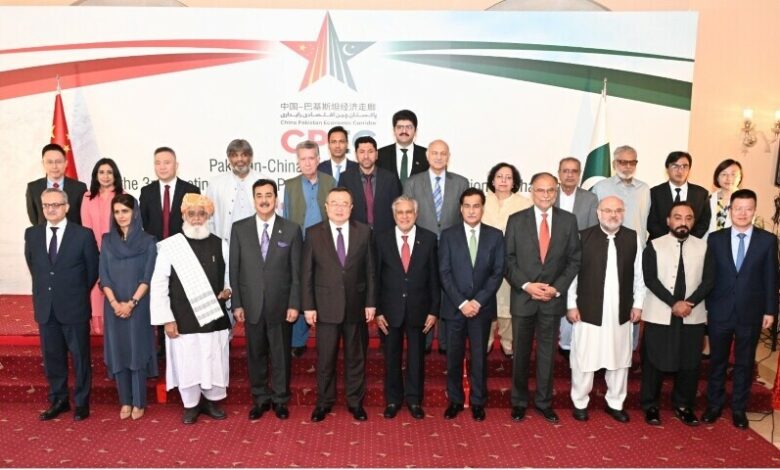Rare cross-party consensus backs CPEC, stronger China ties as Pakistan hosts 3rd JCM – Pakistan


Rare political consensus was shown on Friday at the third meeting of the Pakistan-China Joint Consultative Mechanism (JCM) of Political Parties on the China-Pakistan Economic Corridor (CPEC) in Islamabad.
The cross-party political unity was shown at the CPEC Pakistan-China Political Parties Forum co-chaired by Deputy Prime Minister (DPM) and Foreign Minister Ishaq Dar and Minister of the International Department of the Communist Party of China (IDCPC) and member of the Communist Party Central Committee Liu Jianchao who is on a three-day visit to Pakistan.
Established in 2019, the JCM of Political Parties on CPEC is a regular consultation mechanism between the Communist Party of China and the political parties of Pakistan. Previous meetings were held on March 19, 2019, in Beijing and on August 20, 2020, virtually.
Among prominent political leaders present were Planning Minister Ahsan Iqbal, Science and Technology Minister Khalid Maqbool Siddiqui, National Assembly Speaker Sardar Ayaz Sadiq, Senate Chairman Syed Yousuf Raza Gilani, PPP’s Hina Rabbani, PTI Senator Ali Zafar, Jamiat Ulema-i-Islam-Fazl chief Fazlur Rehman and others.
The leaders reiterated their unwavering commitment to further strengthen the bilateral relationship between Pakistan and China by thwarting all nefarious designs.
In his opening remarks, DPM Dar emphasised the catalytic role that CPEC had played in Pakistan’s socioeconomic development.
“Not only has CPEC helped alleviate chronic load-shedding issues, development projects have also helped create mass employment opportunities in Pakistan,” he said.
Recalling Prime Minister Shehbaz Sharif’s recent visit to China, the DPM said both countries unanimously agreed on executing the second phase of CPEC, in addition to signing the modalities for third-party participation in the project.
He reiterated that Pakistan was committed to promoting people-to-people linkages as both countries stood with each other through “thick and thin”.
Dar further noted that CPEC constituted a vital pillar of the Pak-China economic and strategic partnership and that there was “complete unanimity” on its significance as it catalysed Pakistan’s endeavours toward socioeconomic prosperity and regional connectivity.
He said the two countries were witnessing a high-quality second phase of CPEC with both sides prioritising the agriculture, information technology, industry and mining and mineral sectors.
In his remarks, Liu said the agreements signed during PM Shehbaz’s “very successful” visit provided an opportunity for the two countries to upgrade their ties to bring about desirable changes.
He said the determination of both countries’ leaderships sent a “clear message to the world that the China-Pakistan friendship is unbreakable”.
Calling party-to-party relations an integral part of bilateral relations, Liu said it was “high time” that Pakistan’s political parties contributed their wisdom to turn the blueprint into reality by understanding each other’s development philosophy.
He said the affinity between the two peoples was not commensurate with the iron-clad nature of their friendship and announced that the IDCPC would invite 300 Pakistani parliamentarians to China in three years besides providing scholarships and vocational training to Pakistani youth.
Addressing the JCM, Gilani said all political parties were committed to CPEC as it promoted collaboration in health, education, information technology and other sectors besides its contribution to addressing the power woes of the country.
He urged both sides to work together for a green and resilient future besides strengthening partnership in education and tourism sectors.
Meanwhile, Sadiq said the Parliamentary Committee on CPEC ensured vigilant oversight of the government and followed up on the progress of the projects under CPEC through regular reporting to Parliament.
He reaffirmed the resolve of Parliament, the government and the people of Pakistan to build on past successes and ensure that CPEC reached its full potential.
Iqbal echoed a similar stance, reiterating that despite political differences, all political parties stood unanimous with regards to China and CPEC, and were committed to revitalising the upgraded version.
The minister thanked China for the inclusion of new corridors in CPEC which were aligned with the 5 ‘Es’ framework focusing on exports, equity, empowerment, environment and energy.
Meanwhile, Fazl expressed gratitude to the Chinese leadership for its unconditional support of the Kashmir cause and reiterated Pakistan’s support on the Taiwan issue.
He said both countries had unanimity of views on multiple regional and regional issues, he said, and also called for completion of delayed CPEC projects.
‘Pakistan has special place in China’s foreign policy’
Earlier, Liu said as its iron brother and time-tested friend, China accorded a special place to Pakistan in its foreign policy and desired to strengthen their all-weather strategic cooperative partnership.
In a meeting with DPM Dar, Liu expressed satisfaction at CPEC’s steady pace and said China would extend full cooperation to Pakistan for the timely implementation of all ongoing and new CPEC projects.
He also lauded the political parties of the country for their steadfast support of CPEC and China-Pakistan friendship.
He reiterated China’s keen desire to further enhance linkages between the Communist Party of China and Pakistan’s political parties.
DPM Dar appreciated CPEC’s positive contribution to Pakistan’s socio-economic development, progress and prosperity.
He underscored that as the flagship project of China’s Belt and Road Initiative, CPEC had led to a major transformation in energy security.
Lauding the unanimous political consensus on CPEC in the two countries, Dar expressed Pakistan’s firm resolve to build upon the achievements of CPEC and its high-quality development in Phase II.
The two sides agreed to maintain the momentum of high-level engagements and to further enhance communication on important regional and global issues.
More to follow.
Source link